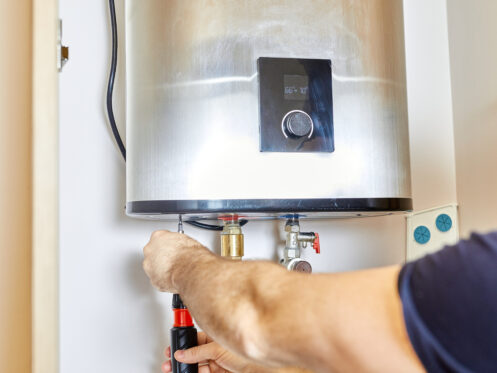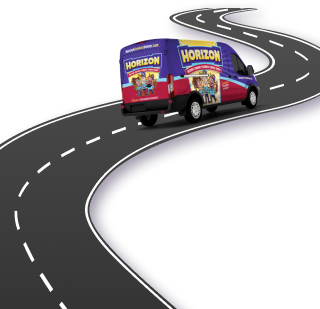Ensuring you have enough hot water to meet all your household’s daily needs is important. That’s why you want to think carefully about which type of unit you want to install whenever it comes time for a water heater replacement. While many people still opt for a traditional water heater, the use of tankless water heaters has grown massively in recent years due to the advantages they have over traditional units. In this article, we’ll compare these two types of water heaters to help you understand the pros and cons of each and ensure you choose the right option for your home.
Upfront Costs
Replacing a water heater is costly. No matter what you choose, you’re usually looking at spending a minimum of $1,500 to $2,000 on the water heater itself plus the installation cost. A traditional electric water heater will typically be the least expensive option, but a traditional gas unit usually won’t cost more than a few hundred dollars extra. Electric and gas tankless water heaters are a bit more expensive to purchase. However, the labor costs to install a tankless water heater are sometimes a bit lower than a traditional unit since tankless water heaters tend to take a bit less time to install. That said, the installation cost depends in large part on whether you’re doing a replacement of what you currently have or switching to a different type of unit or a different fuel source.
If you switch from one type of water heater to the other, the installation will cost more because the plumber needs to change your plumbing to work with the new type of unit. The time when you’ll often pay the most is if you’re switching from gas to electricity or vice versa, since this typically requires quite a bit of additional work.
Hot Water Capabilities
One thing you should always carefully consider when choosing a water heater is your household’s typical hot water requirements. The main issue you can encounter with a traditional water heater is frequently using up all the hot water if you don’t choose a unit with a sufficiently large tank. A 60-gallon water heater is normally sufficient for a house with up to three people. However, you still may not have enough hot water for all three people to shower back-to-back with a unit of this size.
When it comes to hot water supply capabilities, a tankless water heater is superior for one key reason. The unit can essentially provide an unlimited supply of hot water because of its heating on demand. That means you could leave your hot water running all day and night without ever having to worry about running out. Nonetheless, issues can sometimes arise when you have multiple fixtures and/or appliances all using hot water at the same time.
Every tankless water heater has a specific flow rate, which means it can only produce a certain number of gallons per minute. If the amount of hot water you’re trying to use at one time exceeds your unit’s flow rate, you’ll always encounter issues like fluctuations in the water temperature or the water not being fully hot. If you have two showers on at the same time and are drawing more hot water than the unit can supply, it will usually result in the shower that is further away from your water heater not receiving sufficient hot water. If you were showering at the same time as your washing machine or dishwasher was running, your shower may occasionally run cold during the times when the washing machine or dishwasher is drawing hot water. Luckily, these issues are easy to avoid if you choose a tankless water heater with a high enough flow rate to meet all your needs.
Energy Efficiency and Operating Costs
Comparing traditional and tankless water heaters in terms of energy efficiency isn’t easy since they work differently. Energy-efficiency ratings also don’t tell you the whole story. A high-efficiency traditional gas water heater may heat more efficiently than a basic tankless unit while still using more energy overall. This is because it takes more energy to keep a tank of water hot than it does to just heat the water as needed. That’s because the water in a traditional unit continually loses at least a small amount of heat, resulting in the water heater having to occasionally turn on and start reheating. This issue is known as standby heat loss and is one of the main factors that contributes to traditional water heaters typically having higher energy costs than tankless water heaters.
The United States Department of Energy estimates that, on average, a tankless water heater uses somewhere between 8% and 34% less energy than a traditional water heater. However, the difference in how much total energy each type of unit uses depends largely on your hot water demand. A tankless water heater will always save more when your daily hot water demand is lower. If your normal demand is 80 gallons or more per day, the amount you’ll save with a tankless unit will be toward the lower end of the range. A tankless water heater will still save you some money even if your hot water demand is much higher, but you may not save more than a few dollars a month. If your hot water needs are lower, on the other hand, a tankless unit could easily save you a few hundred dollars a year.
Maintenance Needs
All water heaters require some maintenance to continue heating effectively and help prevent the unit from failing earlier. Nonetheless, the maintenance requirements for a traditional water heater are higher because the unit has more components. One of the most essential steps for maintaining a traditional water heater is draining and flushing the unit to get rid of all the sediment in the tank. Sediment naturally forms in a hot water tank because of minerals solidifying when the water gets heated. If you don’t make sure to flush out all the sediment at least once or twice a year, it will quickly lead to your water heater’s performance decreasing. Flushing a traditional water heater also helps to reduce corrosion so that the tank lasts longer before it eventually starts leaking.
If you have a tankless water heater, the most essential task is to descale it occasionally. Mineral deposits and limescale tend to build up within the unit’s heat exchanger. If you don’t descale the water heater to get rid of these deposits, they can build up to the point where they also cause performance issues and can prevent the water from ever getting sufficiently hot.
Life Expectancy
One last thing you should always consider when choosing between a traditional and a tankless water heater is how many years you can expect the unit to last. Traditional gas water heaters have the shortest life expectancy and rarely last for more than 12 years. In some cases, a traditional gas unit can start leaking and need to be replaced in as little as eight years. Traditional electric units typically last a bit longer and have an average life expectancy of 12 to 15 years. If you opt for either a gas or electric tankless water heater, you can usually expect to get at least 20 years of life out of it. With proper maintenance, there’s even a chance a tankless unit may last for up to 30 years.
Since 1998, Horizon Services has been providing reliable, experienced HVAC and plumbing services in Englewood and the Denver Metro area. We’re a locally owned company serving both residential and commercial customers, and our team can assist with all your hot water installation, repair, and maintenance requirements. If you’re still unsure of which type of water heater you should install, contact us today to set up a consultation and learn more about all the options we offer.


